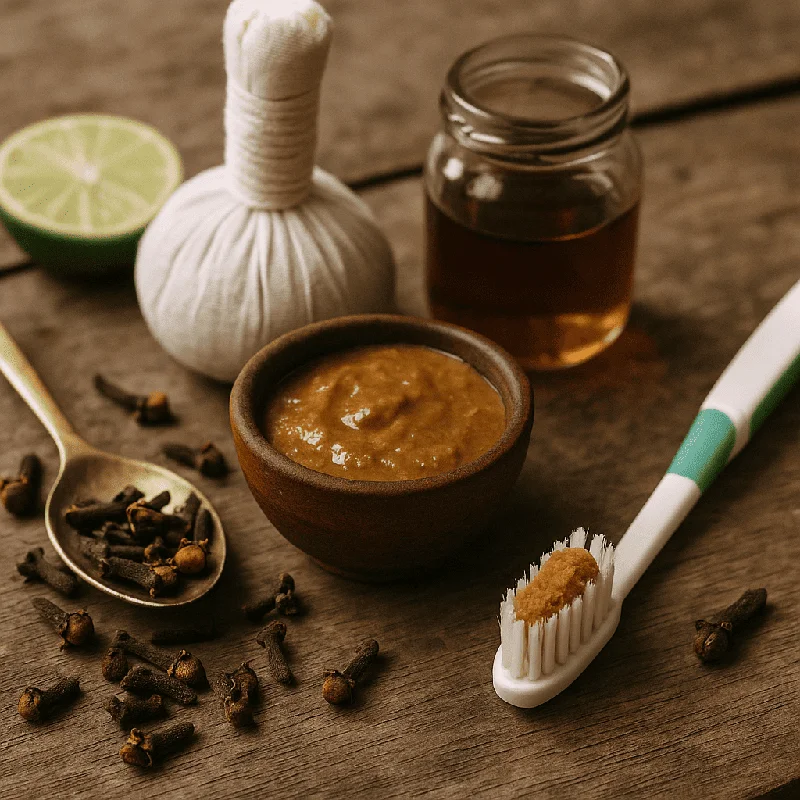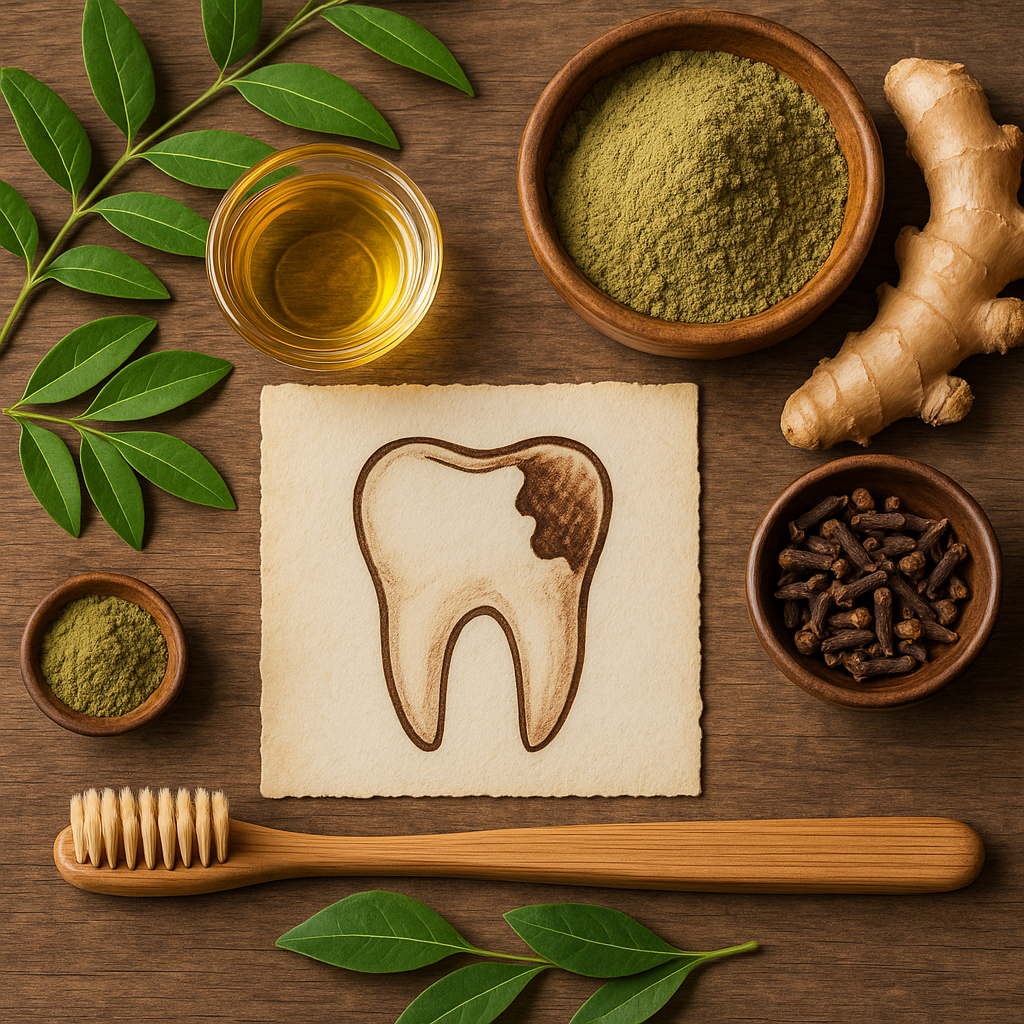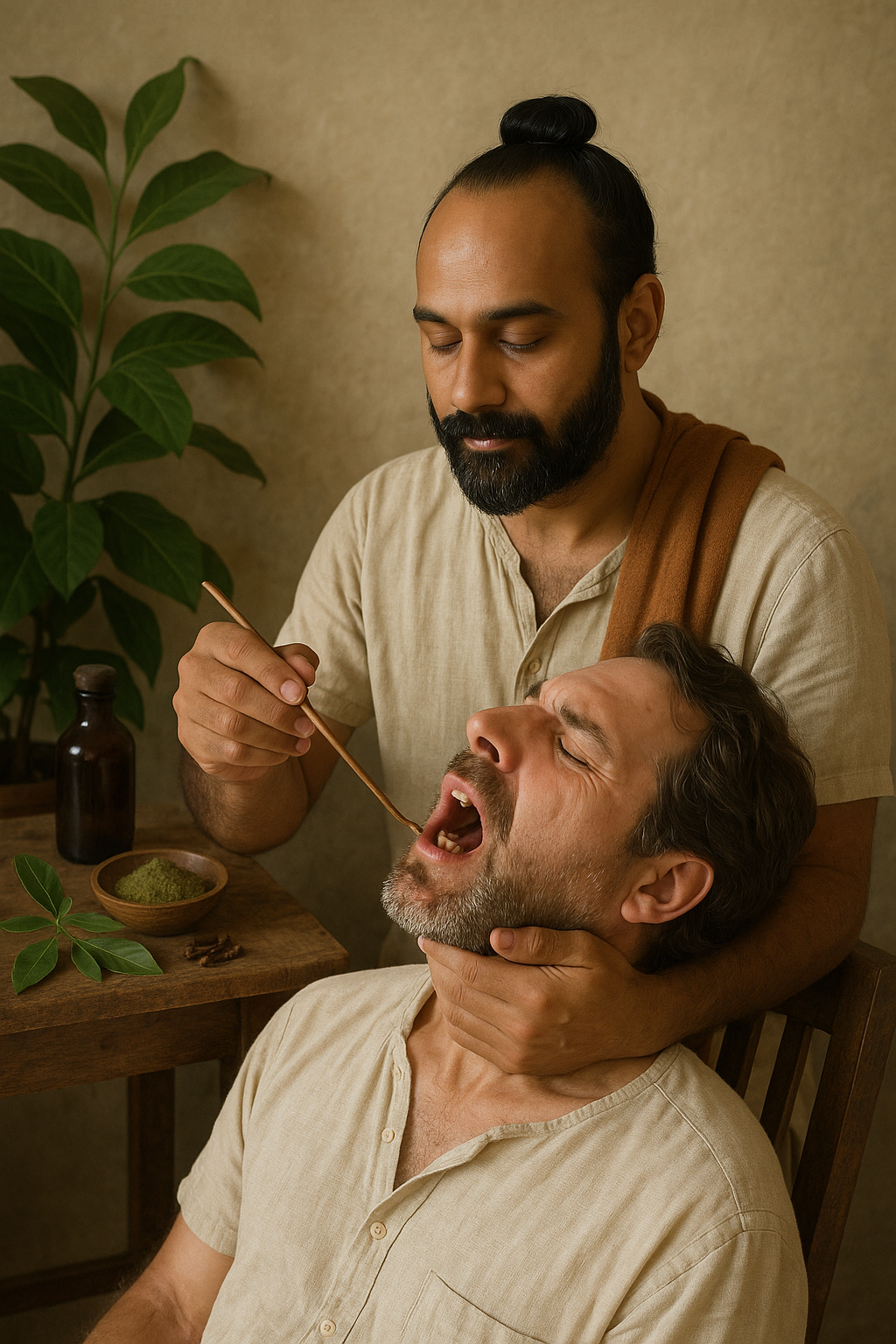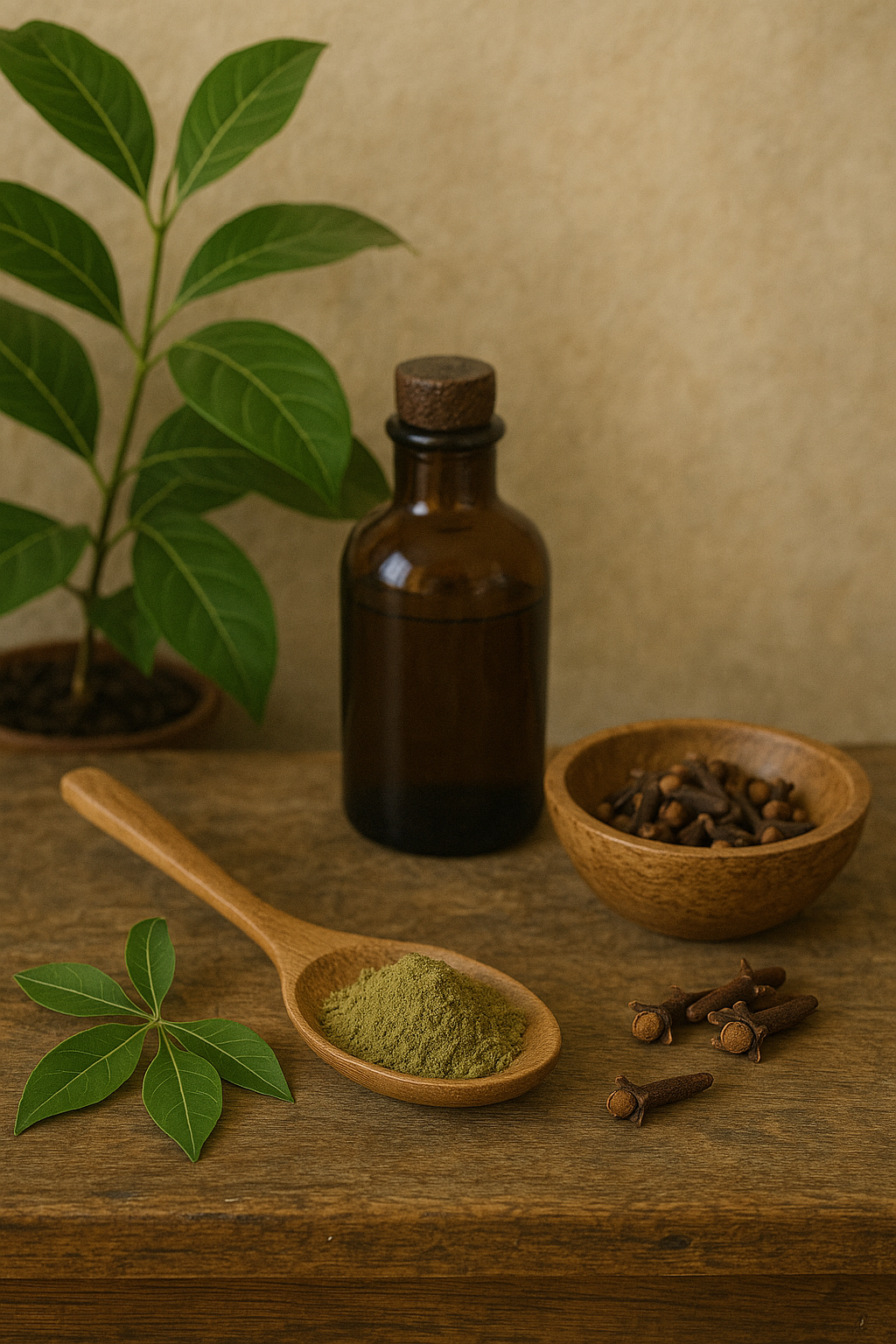Ask Ayurvedic doctor a question and get a consultation online on the problem of your concern in a free or paid mode. More than 2,000 experienced doctors work and wait for your questions on our site and help users to solve their health problems every day.
Ayurvedic Treatment for Tooth Decay: What You Need to Know (And Why It’s Not Just About Brushing)

Introduction
Tooth decay — the one thing we all fear when biting into something cold or sweet — has turned into a modern epidemic. Cavities, sensitivity, pain, bad breath... they sneak in, slowly and silently, and before you know it, you’re in a dentist’s chair holding your jaw with a numbed half-smile. But here's the twist: Ayurveda, the ancient Indian system of medicine, offers a surprisingly comprehensive approach to dealing with it. Not just a patchwork fix, but a full-on root-level strategy — pun intended.
Let’s get one thing clear: we’re not talking about some obscure folk remedy passed down in whispers. Ayurveda is over 5,000 years old, systematized, and increasingly studied by modern science. According to the World Health Organization, oral diseases affect nearly 3.5 billion people globally — and dental caries (aka tooth decay) tops the chart. Now, modern dentistry is a marvel in its own right, but it often focuses on the symptoms. Drill, fill, bill.
Ayurveda? It looks deeper. Think: Why is your body allowing your teeth to decay in the first place?
That’s where things get interesting. From an Ayurvedic point of view, tooth decay isn’t just about bacteria or plaque. It’s about imbalance — in your doshas, in your digestion, in your daily habits. And while that might sound abstract, stay with me, because the practical implications are big. There are herbs, oils, diet changes, mouth cleansing rituals, and therapies you’ve probably never heard of — all with the potential to not only stop tooth decay but prevent it entirely.
In this guide, we’ll dive deep into:
-
What causes tooth decay from an Ayurvedic perspective (hint: it’s not just sugar),
-
What signs you should watch for before it’s too late,
-
How diagnosis works without X-rays,
-
The herbs and oils that have been doing battle with cavities long before Colgate existed,
-
Lifestyle tweaks that could seriously save your smile,
-
And even real patient stories showing that yes, this stuff can work.
Whether you're looking for an alternative to your fifth dental filling or just curious about what Ayurveda says about oral health, this article has something for you. So take a sip of warm turmeric water (we’ll get to that later), and read on.

Understanding Ayurvedic Treatment for Tooth Decay – Ayurvedic Overview
What exactly is Ayurvedic treatment for tooth decay?
Tooth decay, in biomedical terms, is the demineralization and destruction of the hard tissues of the tooth (enamel, dentin, and cementum) caused by acidic byproducts from bacterial fermentation of dietary carbohydrates. Fancy, right? Now pause. Ayurveda sees the whole thing differently.
In Ayurveda, tooth decay falls under the broad category of "Dantaharsha," "Dantashoola," and "Krimidanta." These are ancient Sanskrit terms, but they describe very real conditions: hypersensitivity, toothache, and microbial infestation (not unlike our concept of cavities). Ayurveda links oral health to the balance of the three doshas — Vata, Pitta, and Kapha — and the condition of the Asthi Dhatu (bone tissue), which includes the teeth.
Here's a rough breakdown of how decay unfolds, Ayurvedically speaking:
-
Vitiation of Kapha (due to improper diet, cold or sugary foods) leads to accumulation of Ama (toxic metabolic residue).
-
This weakens the Jatharagni (digestive fire), which in turn affects the nourishment of the Asthi Dhatu.
-
Once the bone tissue is compromised, the teeth lose their strength and resistance.
-
Add to this microbial overgrowth, poor oral hygiene, or emotional stress — boom, you’ve got a recipe for dental disaster.
Ayurveda actually maps out stages of oral disease — starting from dryness in the mouth and mild sensitivity to deep-set pain and pus formation. It’s not always a straight line, and it’s not always obvious. Which is exactly why many people miss the early signs.
Complications? Yes, Ayurveda warns of them. Chronic danta roga (tooth disorders) can lead to inflammation of the jawbone, bad breath (a major social issue), and even systemic imbalances. If the mouth is a gateway to the body, tooth decay is like a guard dog gone rogue.
Ayurvedic perspective: Dosha imbalance and underlying causes
Let’s zoom into doshas. Vata, Pitta, and Kapha aren’t just metaphors. They represent patterns of energy governing all biological functions. Tooth decay? It’s often a Kapha-Vata issue with Pitta flaring up when there’s pain or infection.
Here’s how it plays out:
-
Excess Kapha leads to mucous accumulation and dull digestion, making the mouth a breeding ground for decay.
-
Imbalanced Vata dries out the oral cavity, making the gums shrink and teeth brittle.
-
Pitta aggravation causes inflammation, sensitivity, bleeding gums — the “fire” component.
Now, what's causing all this chaos? Ayurveda is brutally honest here: your food and your habits.
-
Too much sugar, dairy, refined carbs.
-
Sleeping late, skipping meals.
-
Excessive worry, anger, or suppressed emotions.
-
Overuse of cold drinks, especially right after hot meals.
Ayurveda sees emotions, routines, even the way you chew, as potential contributors. Your mind, your body, your toothbrush — they’re all in this together.
How Ayurveda’s view differs from conventional medicine
Here’s the essential difference: Dentistry treats, Ayurveda prevents.
Modern medicine is structured around emergency intervention — drill the cavity, save the tooth, move on. Ayurveda is obsessed with the why. Why are your teeth vulnerable? What part of your systemic balance is out of sync?
Also, Western dental care is overwhelmingly focused on local treatment: the tooth itself. Ayurveda, meanwhile, sees your teeth as extensions of your bone tissue, your digestion, even your liver. So treatment isn’t just about rinses and herbs (though those are involved). It’s also about fixing your gut, calming your nerves, and optimizing your body’s ability to build strong tissues.
That’s not to say one is better than the other. Ideally, you use both — a holistic approach that treats the issue and builds long-term resilience.
Causes and Triggers of Ayurvedic Treatment for Tooth Decay (Ayurvedic Insights)
Main underlying Ayurvedic causes of tooth decay
So here’s where it gets personal. Ayurveda doesn’t hand you a one-size-fits-all cause for tooth decay. Instead, it lays out a web of interconnected issues — your food choices, how you digest them, your emotional patterns, even the season. Yes, the season.
At the root of it all? Dosha imbalance and agni dushti (weak digestive fire). If your digestion is off, your body can’t nourish asthi dhatu — your bones and teeth — properly. This leads to weak enamel and susceptibility to decay. You might be eating "healthy" food, but if your body isn’t processing it right, it's like pouring water on a rock expecting it to grow.
Some classical causes noted in Ayurvedic texts:
-
Atisevana of Madhura-Rasa (excess intake of sweet foods)
-
Guru Ahara (heavy, unctuous, poorly digested foods)
-
Adhyashana (eating before previous meal is digested)
-
Ratri Jagarana (late nights or disrupted sleep)
-
Manasika Karana (emotional disturbances — anxiety, grief, rage)
It sounds like common lifestyle stuff, but Ayurveda connects each of these with systemic changes that affect tissue formation, immunity, and microbial balance in the mouth.
Common triggers and risk factors identified in Ayurveda
Let’s be brutally honest — most of us don’t think about our mouths until something starts hurting. Ayurveda, on the other hand, says prevention begins way before the pain. Here's what it flags as red zones:
-
Irregular eating schedules: Confuses the digestive fire, indirectly impacting oral tissues.
-
Mithya Ahara Vihara: Wrong food + wrong lifestyle = trouble. Snacking on sweets while binge-watching until 2 a.m.? Yeah, Ayurveda saw you.
-
Suppression of natural urges: Believe it or not, avoiding sneezing or holding in urine can disrupt Vata, which later shows up as tooth pain. Sounds weird? Try living by it — you'll be surprised.
-
Poor oral hygiene: Not brushing, sure. But also brushing too hard, or using chemical-laden pastes that strip away beneficial flora.
Why modern lifestyle contributes to rising cases of tooth decay
Think about it — how many of us wake up, chug coffee, run out the door, skip breakfast, eat lunch at our desk, and scroll TikTok until 1 a.m.? That’s not just poor lifestyle. That’s a perfect blueprint for doshic imbalance.
Ayurveda teaches that regularity, mindfulness, and rhythm are key to health. Modern life laughs in the face of rhythm. High sugar intake, processed foods, chronic stress, digital overload, and erratic sleep patterns all compound the Vata-Pitta-Kapha imbalances that trigger oral disease.
Oh, and mouth breathing — that’s a big one. Ayurveda has long emphasized nasal breathing and moist oral tissues. Chronic dry mouth from stress, smoking, or shallow breathing? Major contributor to decay.
Recognizing Symptoms & Early Signs of Tooth Decay
Typical symptoms clearly listed (Ayurvedic perspective)
The early signs often go unnoticed. Or worse, we dismiss them as “just sensitivity” or “something I ate.” Here’s what Ayurveda says to look out for:
-
Dantaharsha – Hypersensitivity to hot, cold, or sweet
-
Dantashoola – Intermittent or lingering toothache, often dull but persistent
-
Raktasrava – Bleeding from gums while brushing or spontaneously
-
Shveta Varnata – Discoloration or chalky patches on teeth
-
Daurgandhya – Persistent bad breath, even with brushing
These are not just annoying symptoms — they’re signs of a deeper imbalance. In early stages, the pain might come and go. Ayurveda encourages action before the pain becomes constant or starts affecting adjacent areas (like the jaw or sinuses).
Less obvious or overlooked signs
Here’s where it gets sneaky. Some signs seem totally unrelated to your teeth but are actually warning signals in Ayurvedic logic:
-
Frequent constipation or gas (poor digestion, weakened agni)
-
Dryness or burning in the mouth
-
A sour taste even after brushing
-
Cracking nails or brittle hair (weakened asthi dhatu — also linked to tooth health)
And if your tongue has a thick white coating? Ayurveda interprets that as Ama buildup — toxins that interfere with nutrient absorption. Which means even your “calcium-rich” diet might not be helping.
When should you seek Ayurvedic help? And when can Ayurveda not help?
If you're experiencing early-stage symptoms — mild pain, sensitivity, gum inflammation — Ayurveda is not just helpful, it's ideal. It can reverse minor decay, strengthen the tissues, and stop further damage.
But if you’re dealing with:
-
Abscesses
-
Deep cavities reaching the pulp
-
Structural damage or cracked teeth
...you may still need conventional dentistry. Ayurveda can support healing, but don’t expect herbs to fill a crater. Even ancient medicine respects the power of a root canal when it’s really needed.

Ayurvedic Diagnosis Methods for Tooth Decay
Pulse diagnosis, tongue analysis, and other traditional methods
Let’s get real — Ayurvedic diagnostics aren’t what you’re used to. No X-rays, no drilling around with metal pokers. Instead, it starts with Nadi Pariksha — pulse diagnosis.
An experienced Vaidya (Ayurvedic doctor) can detect imbalances in Vata, Pitta, and Kapha through subtle variations in your pulse. It’s a skill that takes years to develop. But when done well, it’s shockingly accurate.
Then there’s Jihva Pariksha — tongue analysis. A thick white coating? Signs of Ama. A red tip? Excess Pitta. Teeth marks along the edges? Vata imbalance. It’s like your tongue is tattling on your organs.
They might also look at:
-
Your skin and nail health
-
Quality of your saliva (thick, dry, foamy)
-
Smell of your breath (sour, sweet, or metallic — each reveals something different)
Determining Dosha imbalance specific to tooth decay
Each type of dosha imbalance shows up differently in oral health:
-
Vata decay: Cracking, pain without infection, dry mouth, brittle teeth
-
Pitta decay: Inflammation, bleeding, burning pain, sour taste
-
Kapha decay: Sticky plaque, mucous buildup, dull ache, sluggish digestion
Identifying this is essential — it determines your treatment. A Vata imbalance won’t respond well to the same herbs or oils as a Pitta case. That’s the core difference with Ayurveda: diagnosis isn’t about what’s decayed, but why.
Ayurvedic Treatments & Remedies for Tooth Decay
Ayurvedic herbs and medicines effective for tooth decay
Now we’re talking action. Ayurveda has a toolkit of time-tested remedies, many of which are available in powders, pastes, or decoctions.
Here’s a shortlist of rockstar herbs:
-
Triphala (cleansing, anti-inflammatory, balances all doshas)
-
Arimedadi Taila (herbal oil for gargling, strengthens gums)
-
Dashana Samskara Churna (tooth powder, reduces bleeding, prevents decay)
-
Bakula (Mimusops elengi) – Strengthens teeth, anti-caries
-
Neem (Azadirachta indica) – Antibacterial, plaque remover
Typical usage:
-
Triphala decoction for mouth rinse at night
-
Oil pulling with Arimedadi Taila in the morning for 5–15 mins
-
Tooth powder (Churna) applied with fingers, gently massaged into gums
Dosage varies — always consult a practitioner.
Ayurvedic therapies and Panchakarma treatments
For advanced decay or chronic oral issues, detox therapies help.
-
Kavala and Gandusha: Oil or decoction held in the mouth to draw out toxins
-
Nasya: Herbal oil applied to the nasal passages to support oral and cranial health
-
Virechana: Gentle purgation to eliminate excess Pitta from the system
Sounds intense? It’s actually deeply rejuvenating when done under supervision.
Effective Ayurvedic home remedies and self-care advice
-
Salt + mustard oil gum massage: Classic and effective (especially for Kapha types)
-
Clove oil dabbed directly on the cavity: Instant pain relief
-
Chewing neem twigs: Nature’s toothbrush
-
Warm turmeric water rinse: Anti-inflammatory and antiseptic
-
Don’t drink cold water after hot food: Seriously, stop.
Ayurveda isn't about finding one miracle product. It’s about weaving together habits that create a terrain where decay just... can’t grow.
Diet & Lifestyle Recommendations for Managing Tooth Decay
Recommended foods and dietary guidelines for tooth decay
First, let’s lay this out clearly: Ayurveda does not believe calcium pills alone will save your teeth. It believes that proper digestion, assimilation, and balanced nourishment are the keys. So, what should you actually eat?
-
Warm, cooked foods — soups, stews, soft khichdi. These are easy to digest and nourish asthi dhatu.
-
Ghee — especially medicated ghee like Dashmoola ghrita or plain cow ghee. It strengthens tissues, lubricates joints, and supports absorption of minerals.
-
Til (sesame seeds) — rich in calcium and great when roasted and ground.
-
Moringa (drumstick leaves) — bone builder, high in iron and calcium.
-
Milk — preferably warm, boiled, and spiced with turmeric or cardamom to aid digestion.
-
Spices like cumin, ajwain, and hing — enhance digestion, prevent Ama buildup.
-
Ragi (finger millet) — calcium-rich and very sattvic when properly cooked.
-
Soaked almonds and dates — great for Vata types, support strength and moisture in the body.
How and when to eat matters more than you think:
-
Eat at the same time every day.
-
Avoid snacking between meals — let digestion reset.
-
Eat in a calm, focused state — not in front of your phone or laptop.
-
Drink warm water or herbal teas — not cold drinks.
-
Use rock salt or black salt — not commercial iodized salt.
And yes — chew your food. Digestion begins in the mouth.
Foods and drinks to avoid for tooth decay
Here’s the list that might hurt a bit (but your teeth will thank you):
-
Cold drinks, ice creams, and carbonated sodas — they weaken digestion and aggravate Vata/Kapha.
-
Refined sugar — obviously. But also hidden sugars in “healthy” granola, yogurt, sauces.
-
Sticky foods — especially if they linger on teeth (think toffees, dried fruits).
-
Raw salads in excess — hard to digest and aggravate Vata.
-
Fermented foods — like pickles, vinegar — heat the system and can disturb Pitta.
-
Too much citrus — over time, it erodes enamel.
-
Junk food — processed snacks are usually Vata-aggravating and Pitta-disturbing.
Food combinations to avoid:
-
Milk + salty foods
-
Fruit + dairy
-
Sour + milk
-
Fish + yogurt
These clash energetically, and over time, the system reacts. Ayurveda warns that such combinations can subtly weaken tissue formation — including bones and teeth.
Daily routine and lifestyle tips to control tooth decay
This is probably where the magic lies. Ayurveda is big on Dinacharya (daily routine). It’s not just about what you do — it’s about rhythm.
Ideal daily schedule for oral health:
-
Wake up before sunrise (Brahma Muhurta)
-
Oil pulling (Gandusha) first thing in the morning
-
Brush with herbal powders or paste — not chemical foam bombs
-
Tongue scraping is a must — removes toxins
-
Light stretching or yoga to balance doshas
-
Three well-spaced meals — no snacking
-
Avoid late dinners or sleeping immediately after eating
-
No cold foods or drinks after sunset
Physical activity should be gentle but consistent — brisk walking, yoga, even chewing properly! Seriously, chewing is considered the first act of self-care in digestion.
Real Patient Experiences & Success Stories
I once met a school teacher — let’s call her Sunita — who came to an Ayurvedic clinic with tooth sensitivity so bad she could barely drink water. Her dentist had already suggested a root canal. But she wasn’t ready.
Under supervision, she went all in on the Ayurvedic plan: Triphala rinses, oil pulling, shifting to warm, spiced foods, and cutting out all cold drinks. She also began practicing Pranayama daily.
Within 10 days, her pain was 70% better. At 3 weeks, she could drink cold water again. Six months later, her dentist told her the cavity had recalcified naturally — no drill needed.
Of course, not every case ends like this. But stories like Sunita’s are increasingly common in Ayurvedic circles — and they speak to the body’s capacity to heal when properly supported.

Scientific Evidence & Research on Ayurvedic Effectiveness for Tooth Decay
Quick summary of relevant scientific findings
Ayurveda might be ancient, but it’s gaining traction in the scientific world. A growing number of studies are validating its oral health benefits.
-
A 2017 study published in Journal of Ayurveda and Integrative Medicine showed Triphala mouthwash was as effective as chlorhexidine in reducing plaque and gingivitis — without side effects.
-
Another clinical trial from AYU Journal highlighted the effectiveness of Arimedadi Taila in managing bleeding gums and early-stage periodontitis.
-
Neem-based oral care products have been proven to exhibit broad-spectrum antimicrobial activity against Streptococcus mutans — the main bacteria in cavities.
Comparisons between Ayurveda and conventional medicine outcomes
Here’s a bold truth: Ayurveda often works slower than allopathy — but it treats the root. Modern dentistry removes decay; Ayurveda prevents recurrence.
-
Modern medicine offers localized, often invasive interventions — fillings, extractions, root canals.
-
Ayurveda works holistically — rebalancing digestion, doshas, and lifestyle.
Patients using both often find that Ayurveda enhances the results of dental procedures and prevents future issues. It’s not either/or — it’s both/and.
Reliable external sources
To explore more, check:
-
WHO - Traditional Medicine -
Ministry of AYUSH, Govt. of India -
National Institutes of Health (NIH) -
PubMed -
All India Institute of Ayurveda
Common Misconceptions About Tooth Decay and Ayurveda
Let’s bust a few myths:
-
“Ayurveda is too slow to treat tooth pain.” Not true. Pain relief can start within days when protocols are followed precisely.
-
“Only modern medicine can reverse cavities.” Partially true. Ayurveda can reverse early caries and prevent progression.
-
“You can’t combine Ayurveda with dental treatments.” False. They can be synergistic — Ayurveda can support post-op healing and reduce recurrence.
-
“Ayurvedic herbs are unsafe or untested.” Many are well-studied. Neem, clove, licorice — all have robust scientific backing.
Conclusion
So, here’s the thing. Tooth decay isn’t just a dental issue — it’s a sign that something deeper is off. Maybe it’s your digestion. Maybe it’s your routine. Maybe it’s all that cold brew you’ve been sipping.
Ayurveda doesn’t just offer treatment — it offers insight. It asks us to slow down, tune in, and take our bodies seriously. Its remedies are gentle, but powerful. Its approach is slow, but lasting.
We’ve looked at everything from symptoms to herbs, from daily routines to scientific studies. And through it all, the message is clear: your body is capable of healing. You just need to give it the tools.
If you’re curious about what your dosha might be, or which herbs are safest for your body, don’t guess. Talk to someone who knows.
👉 Want a personalized Ayurvedic consultation? Visit Ask-Ayurveda.com to get started.
Frequently Asked Questions (FAQ)
Q1: Can Ayurveda really reverse tooth decay?
Yes — if caught early. Ayurveda can remineralize early caries, reduce inflammation, and prevent progression. Once decay reaches the pulp, though, you’ll likely need modern intervention.
Q2: Is oil pulling safe every day?
Absolutely. Daily oil pulling with sesame or Arimedadi oil can significantly improve oral health. Just don’t swallow the oil — it contains toxins drawn from the tissues.
Q3: How long does it take for Ayurvedic treatment to show results?
For minor issues, 7–21 days is typical. For deeper problems, expect a few months of consistent application — herbs, diet, and lifestyle together.
Q4: Are Ayurvedic tooth powders better than toothpaste?
Depends. Ayurvedic powders are excellent for gum massage, microbial control, and dosha balancing. But if you have very sensitive teeth, start slow and monitor how your gums respond.
Q5: Can kids use Ayurvedic remedies for cavities?
Yes — but dosages must be adjusted. Neem sticks, Triphala rinses, and clove oil (diluted!) are safe under supervision. Always check with a practitioner first.
References & Authoritative Sources
-
World Health Organization -
Ministry of AYUSH -
PubMed -
National Institute of Dental and Craniofacial Research -
All India Institute of Ayurveda -
National Institutes of Health

